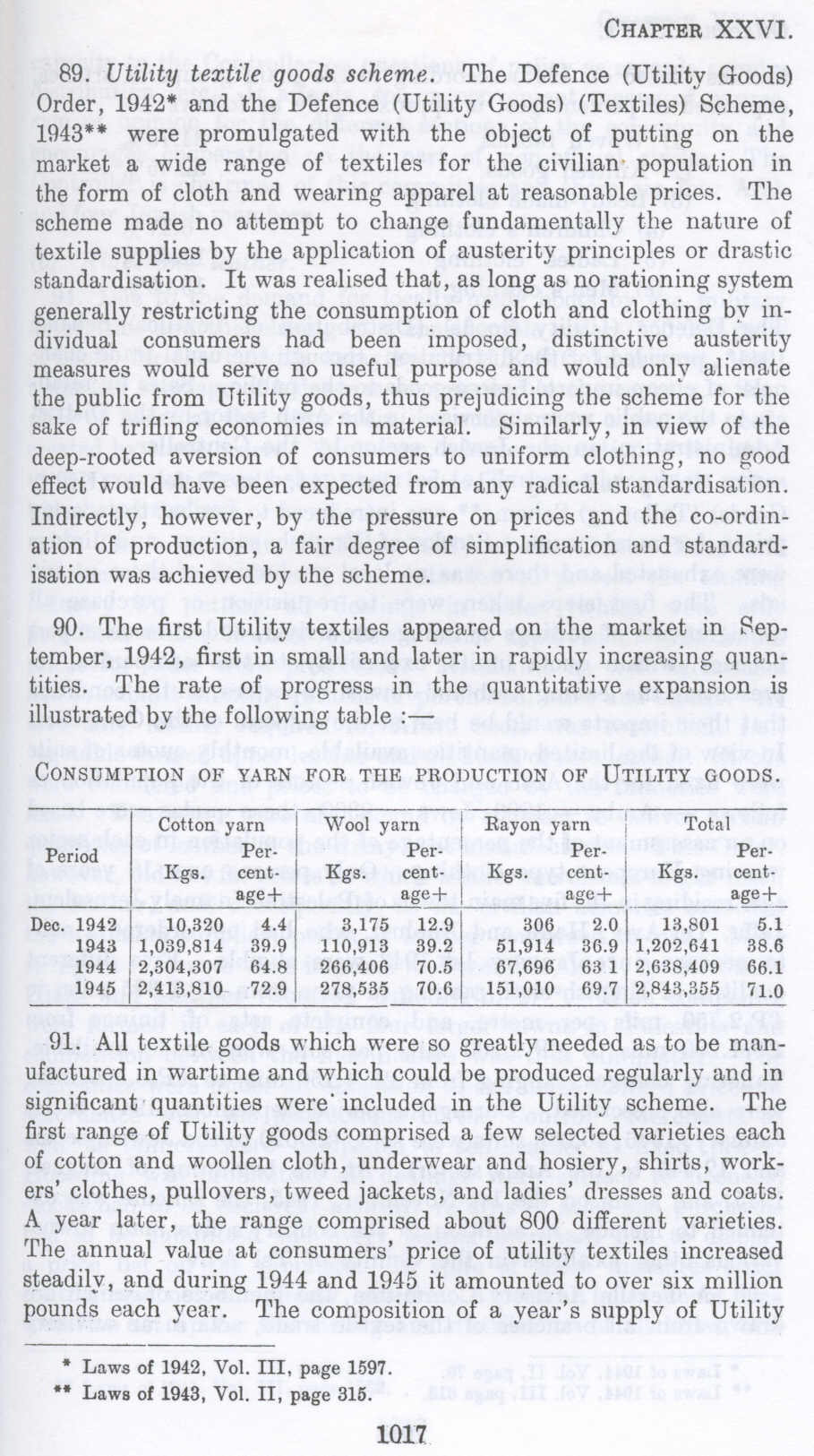| Prev | Next |  |
| Prev | Next |
| PalestineRemembered | About Us | Oral History | العربية | |
| Pictures | Zionist FAQs | Haavara | Maps | |
| Search |
| Camps |
| Districts |
| Acre |
| Baysan |
| Beersheba |
| Bethlehem |
| Gaza |
| Haifa |
| Hebron |
| Jaffa |
| Jericho |
| Jerusalem |
| Jinin |
| Nablus |
| Nazareth |
| Ramallah |
| al-Ramla |
| Safad |
| Tiberias |
| Tulkarm |
| Donate |
| Contact |
| Profile |
| Videos |
British Mandate: A Survey of Palestine: Volume II - Page 1017 |
Disclaimer
The above documents, article, interviews, movies, podcasts, or stories reflects solely the research and opinions of its authors. PalestineRemembered.com makes its best effort to validate its contents.


Post Your Comment
*It should be NOTED that your email address won't be shared, and all communications between members will be routed via the website's mail server.
89. Utility textile goods scheme. The Defence (Utility Goods) Order, 1942* and the Defence (Utility Goods) (Textiles) Scheme, 1943.. were promulgated with the object of putting on the market a wide range of textiles for the civilian• population in the form of cloth and wearing apparel at reasonable prices. The scheme made no attempt to change fundamentally the nature of textile supplies by the application of austerity principles or drastic standardisation. It was realised that, as long as no rationing system generally restricting the consumption of cloth and clothing by individual consumers had been imposed, distinctive austerity measures would serve no useful purpose and would only alienate the public from Utility goods, thus prejudicing the scheme for the sake of trifling economies in material. Similarly, in view of the deep-rooted aversion of consumers to uniform clothing, no good effect would have been expected from any radical standardisation. Indirectly, however, by the pressure ou prices and the co-ordination of production, a fair degree of simplification and standardisation was achieved by the scheme.
90. The first Utility textiles appeared on the market in September, 1942, first in small and later in rapidly increasing quantities. The rate of progress in the quantitative expansion is illustrated by the following table :-
CONSUMPTION OF YARN FOR THE PRODUCTION OF UTILITY GOODS.
Cotton yarn I 'Wool yam I Rayon yarn I 'fotnl
Period I Per• Per- Pc*• 1 Per-
Kgs. cent- Kga. cent- ! Kgs. cent- Kge. cent-
age age age age
Dec. 1942 l I0,320 441 3,175 12.91 306 2.0 I 13.601 5.1
1943 1,039,814 39.9 110,913 39.2 51,914 36.9 1,202,641 38.6
1944 2,304,307 64.8 266,406 70.5 67,696 63 1 2,638,409 66.1
1945 2,413,810 72.9 278,535 70.6 151,010 69.7 2,843,355 71.0
91. All textile goods which were so greatly needed as to be manufactured in wartime and which could be produced regularly and in significant quantities were• included in the Utility scheme. The first range of Utility goods comprised a few selected varieties each of cotton and woollen cloth, underwear and hosiery, shirts, workers' clothes, pullovers, tweed jackets, and ladies' dresses and coats. A year later, the range comprised about 800 different varieties. The annual value at consumers' price of utility textiles increased steadily, and during 1944 and 1945 it amounted to over six million pounds each year. The composition of a year's supply of Utility
_______________________________________________________
* Laws of 1942, Vol. III, page 1597 .
** Laws of 1943, Vol. II, page 315.
1017